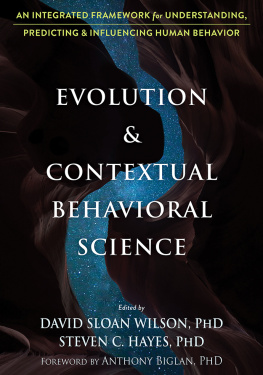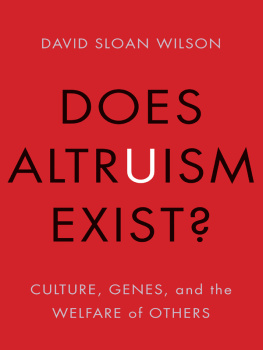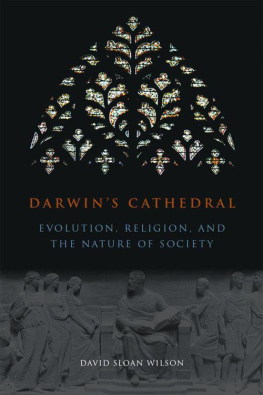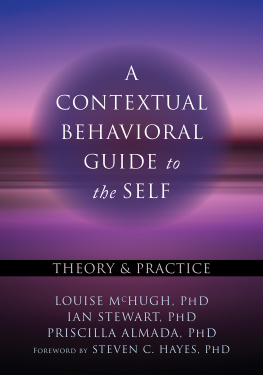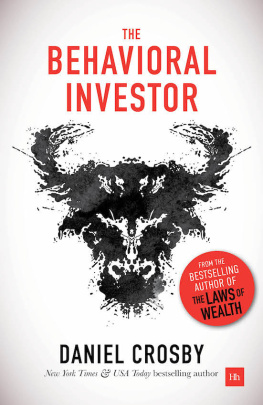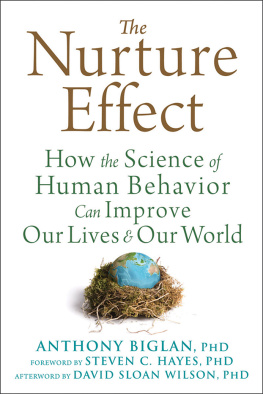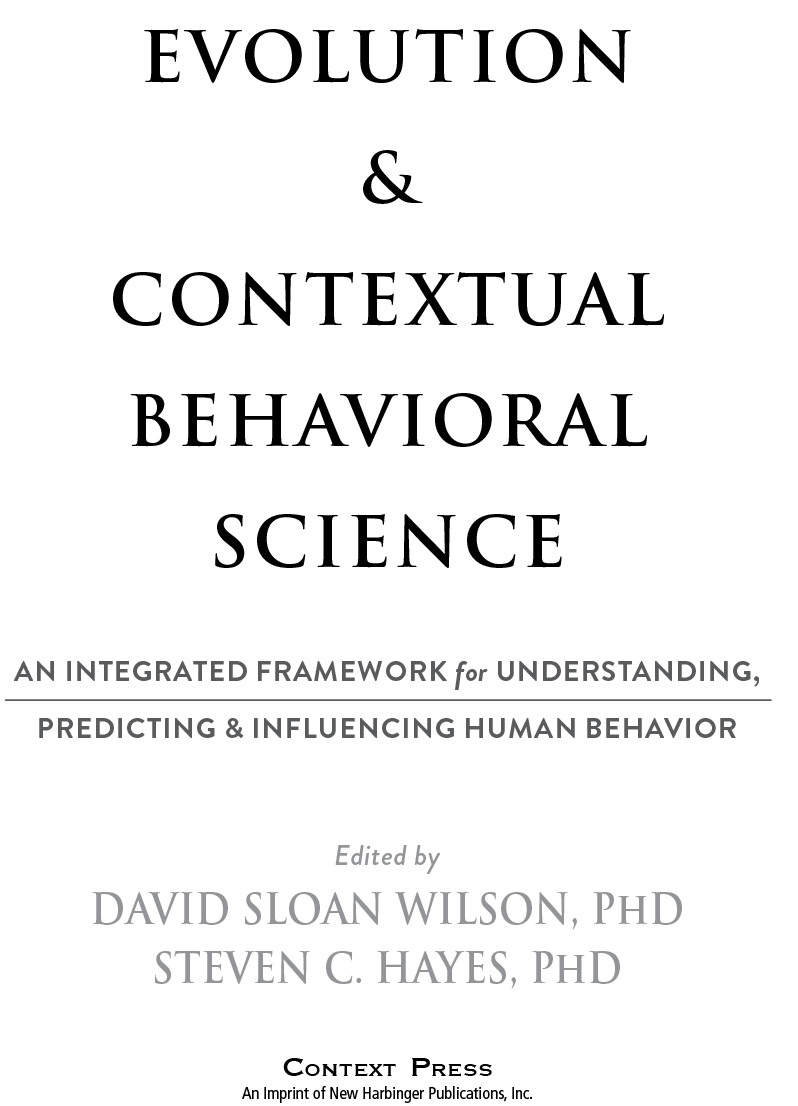The best ideas seem simple and obvious in retrospect. What, for example, could be simpler or more obvious than the principle of selection by consequences? And yet, when Darwin applied this simple and obvious principle to phenotypic variation, we got natural selection, biologys biggest idea. Then, about one hundred years later, Skinner applied the same principle and gave us behavior analysis; a view of learning (among other things) that still has no serious explanatory rival in psychology. With this volume, David Sloan Wilson and Steven Hayes have assembled chapters by some of the most creative and rigorous minds in their respective disciplines. Their collective efforts offer an updated and elaborated account of these two big ideas, making clear along the way what only nowin retrospectseems so simple and obvious: that Evolution and Contextual Behavioral Science are scientific sprouts off the same conceptual root.
James Coan, PhD , professor at the University of Virginia
This is a remarkable and unique volume that will likely start a paradigm shift in the behavioral sciences. Edited by the foremost leaders in their respective fields, David Sloan Wilson and Steven C. Hayes assembled a fascinating collection of chapters to derive a framework for understanding and changing human behavior. If Skinner and Darwin had been asked to write a book together after further developing their ideas, this would have been the one. Evolution and Contextual Behavioral Science will change the way you think about humans.
Stefan G. Hofmann, PhD , professor in the department of psychological and brain sciences at Boston University
The human mind is different from that of all other animals because of our cognitive abilities. It has given rise to extraordinary cultures both good and bad, to cooperation, language, art, science, and medicine but also war, slavery, factory farming, and the enjoyment of violence. The key to understanding how the human mind works is an understanding of its evolved functional motives and competencies, and their contextual phenotypic organization. What nature prepares us with, our social niche grows, patterns, and choreographs. This volume brings together two of the worlds outstanding and leading exponents on both dimensions, the evolved nature of mind and the contextual choreographies of mind, partly but not only through language. Together this range of contributors provide a fascinating and scholarly set of writings with the focus to integrate and cross-fertilize these two bodies of scientific investigation. Together they take a deep dive into the link between nature and culture. Its a must-read for anybody interested in this fundamental analysis of the human condition.
Paul Gilbert , OBE, PhD , is professor in the department of psychology at the University of Derby, and author of Human Nature and Suffering and The Compassionate Mind
Publishers Note
This publication is designed to provide accurate and authoritative information in regard to the subject matter covered. It is sold with the understanding that the publisher is not engaged in rendering psychological, financial, legal, or other professional services. If expert assistance or counseling is needed, the services of a competent professional should be sought.
Distributed in Canada by Raincoast Books
Copyright 2018 by David Sloan Wilson and Steven C. Hayes
Context Press
An imprint of New Harbinger Publications, Inc.
5674 Shattuck Avenue
Oakland, CA 94609
www.newharbinger.com
Cover design by Amy Shoup
Acquired by Catharine Meyers
Indexed by James Minkin
All Rights Reserved
Library of Congress Cataloging-in-Publication Data on file
Contents
Foreword
I think the most important contribution Ive made to the behavioral sciences is to introduce Steven C. Hayes and David Sloan Wilson to each other.
As contextual behavioral scientists, Steve and I go back a long way. As long as twenty-five years ago, we were discussing the need to extend the contextual behavioral way of thinking beyond psychology. A little over ten years ago, I encountered David. I was interested in talking to him about his evolutionary account of religion, Darwins Cathedral . He told me about a new book he had published, Evolution for Everyone. As I read it, I kept saying to myself , This is how I think! But then I would encounter a mention of B. F. Skinners work and go, Ahno .
As I got to know David, though, I realized that he was not only a contextualist but a scientist open to new ideas and eager to bring together people who shared his evolutionary perspective. I told Steve that he had to meet this guy and brought them together at a meeting I organized in Denver. They have been learning from each other ever since, and this volume is one important result of their collaboration.
It comes at a critical time. Over the past 250 years, science and capitalism have combined to transform the world in ways that would seem miraculous to people living in the nineteenth century. Yet the miracles of our progress are accompanied by great dangers. We have produced nuclear weapons that continue to proliferate and threaten horrific destruction and international terrorist organizations whose growth and harm has been enabled by the Internet. Our steadily increasing material wealth has been accompanied by increasing levels of economic inequality. And despite solid scientific understanding of the looming, catastrophic consequences of climate change, our exploration, production, and use of fossil fuels continues to expand.
This volume attests to the fact that science can be done within a framework that is guided by a set of explicit values. The community of scientists writing in this book are focused on ensuring the well-being of every person. They are doing this through the pursuit of basic principles that we can use to evolve more nurturing societies.
As this volume shows, the combination of evolution and contextual behavioral science produces a science of substantial scopeaddressing issues as diverse as animal learning, human symbolic learning, adolescent development, psychopathology, empathy and emotions, evolutionary mismatch, and human health, and the selection of group and organizational practices.
It is also a science of considerable depth, addressing evolution at the genetic, epigenetic, behavioral, and symbolic levelsand fostering research on the complex interactions among these processes.
Every facet of human behavior addressed in this book is relevant to the project of evolving societies with greater well-being and better prospects for preventing the catastrophes that endanger us. The fundamental challenge we face is whether we can promote prosocial and communitarian values, behaviors, and organizational practices in the face of contingencies that have selected for wealth accumulation and self-aggrandizement, especially over the past fifty years.
As this volume attests, we are making progress in understandingand influencingsymbolic thought and communication. The contextual analysis of the behavior of individuals has reached a stage where we understand the kinds of environments that people need to thrive.
We are making substantial progress in treating psychological and behavioral problems and guiding adolescent development so that lifelong problems are prevented.
We are beginning to understand the ways in which evolutionary mismatch threatens modern humans health and we are defining what is needed to address these mismatches.

